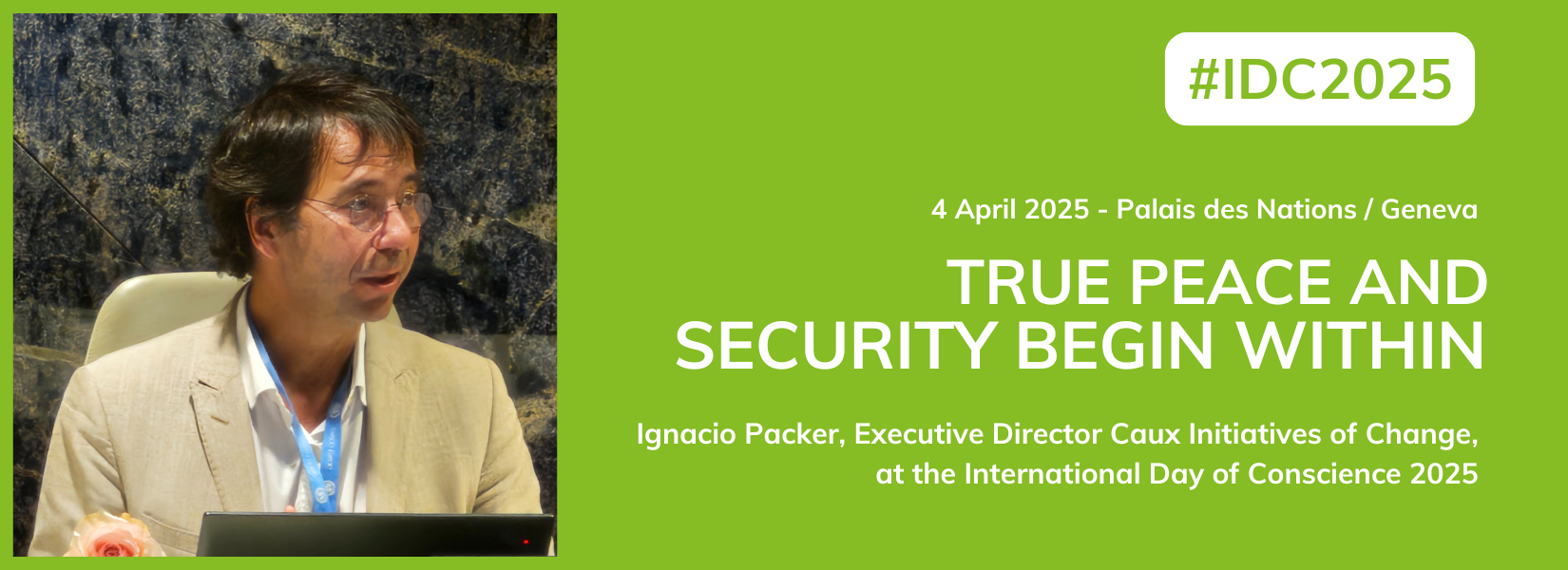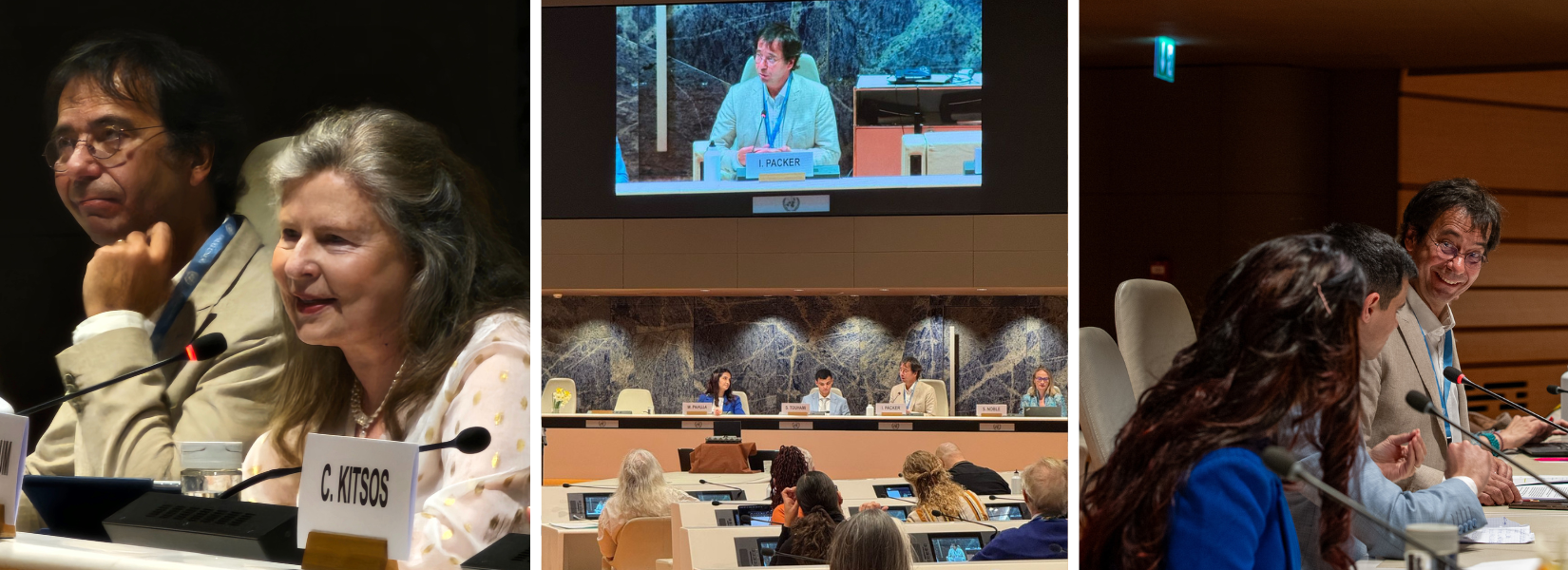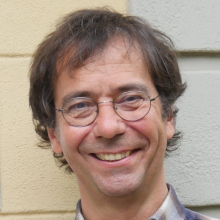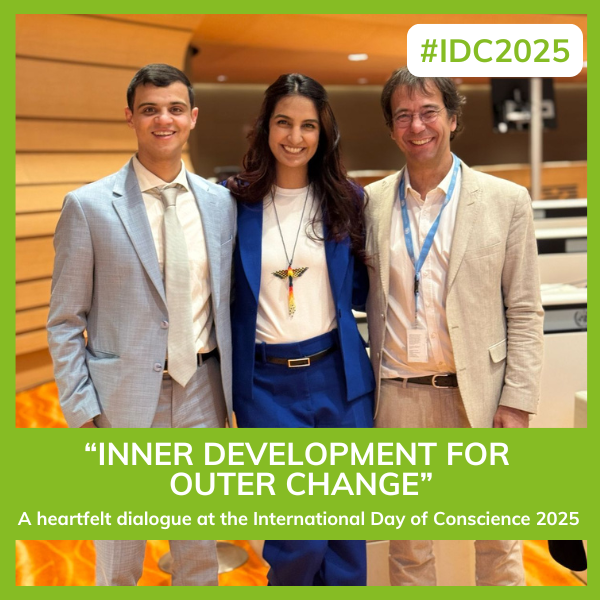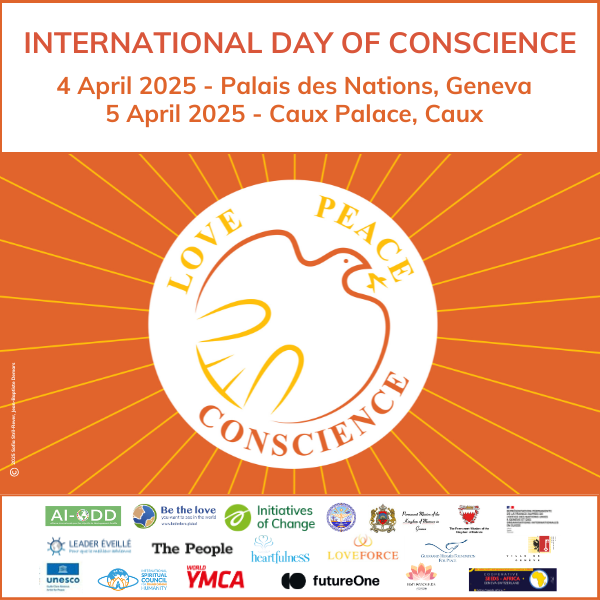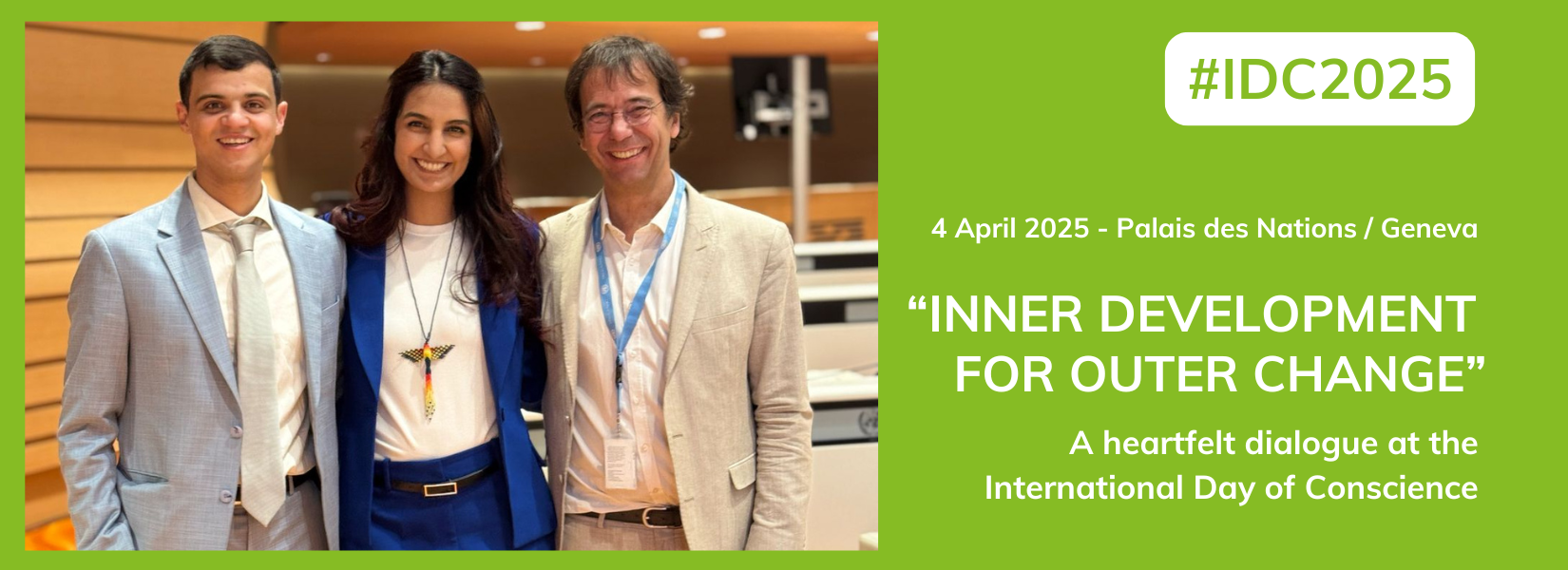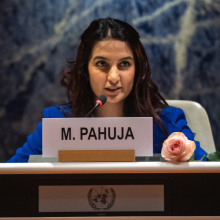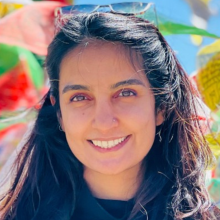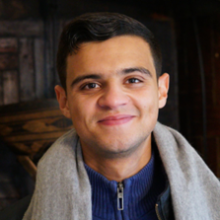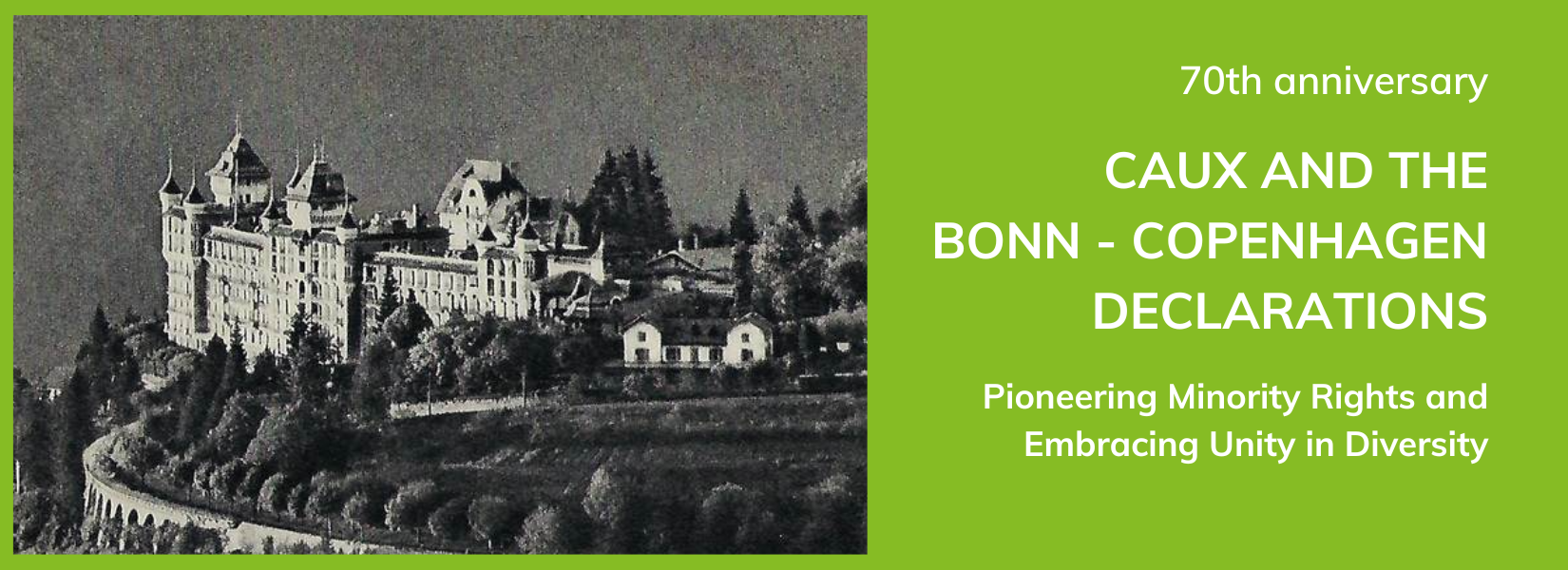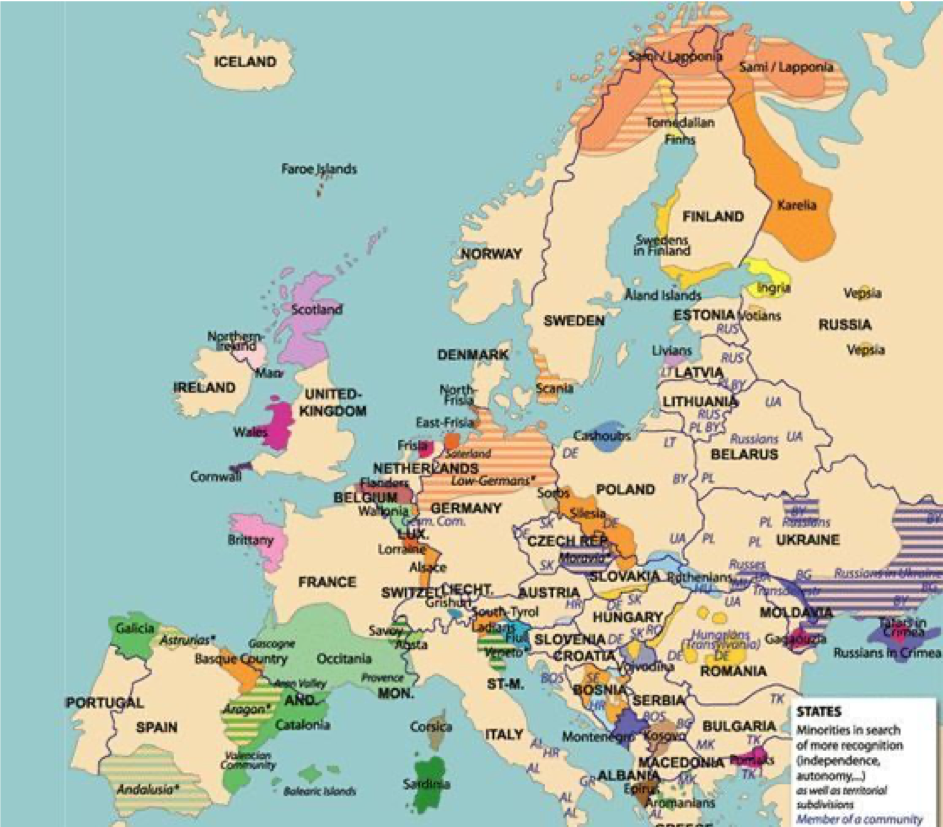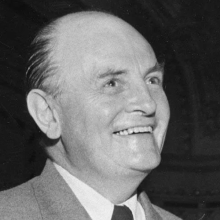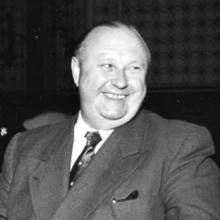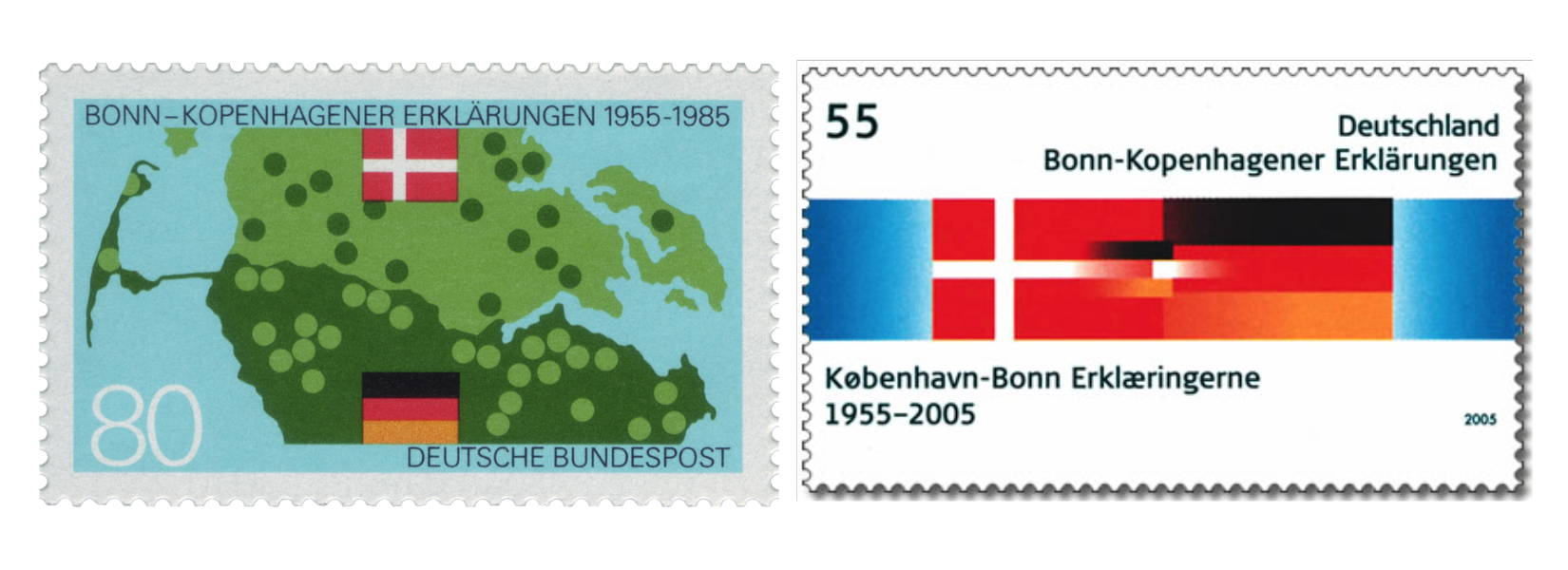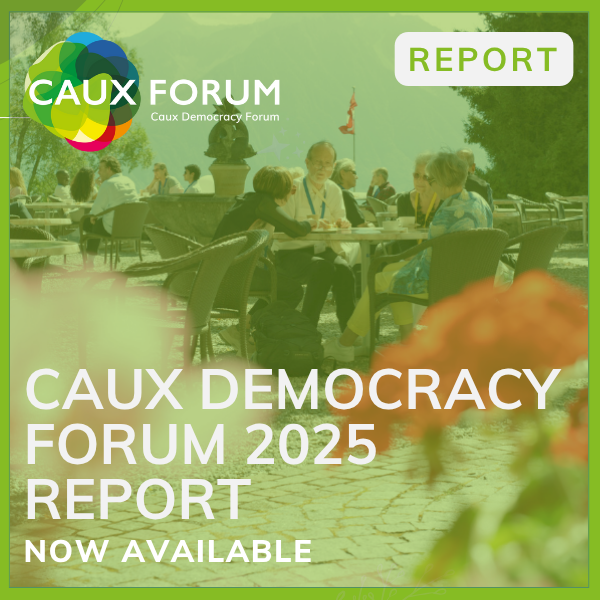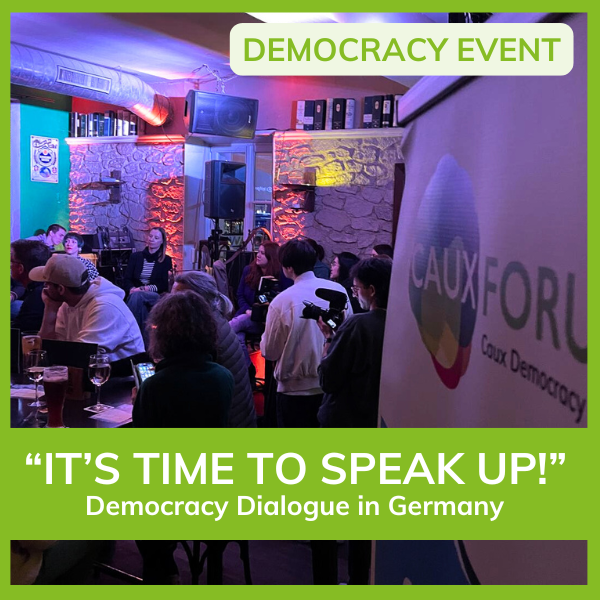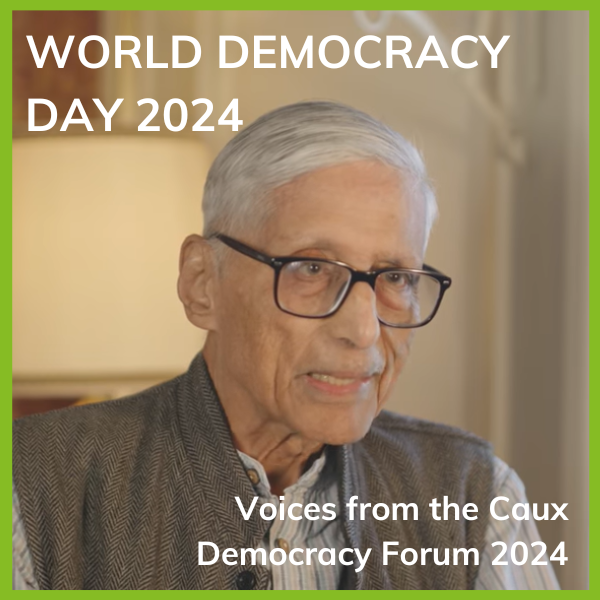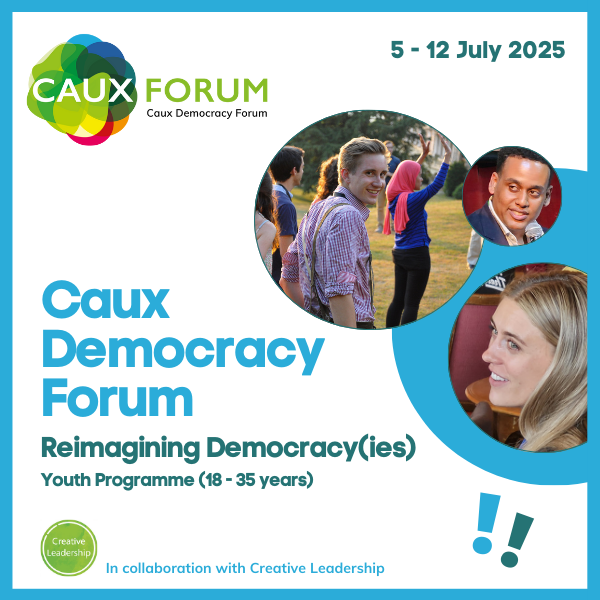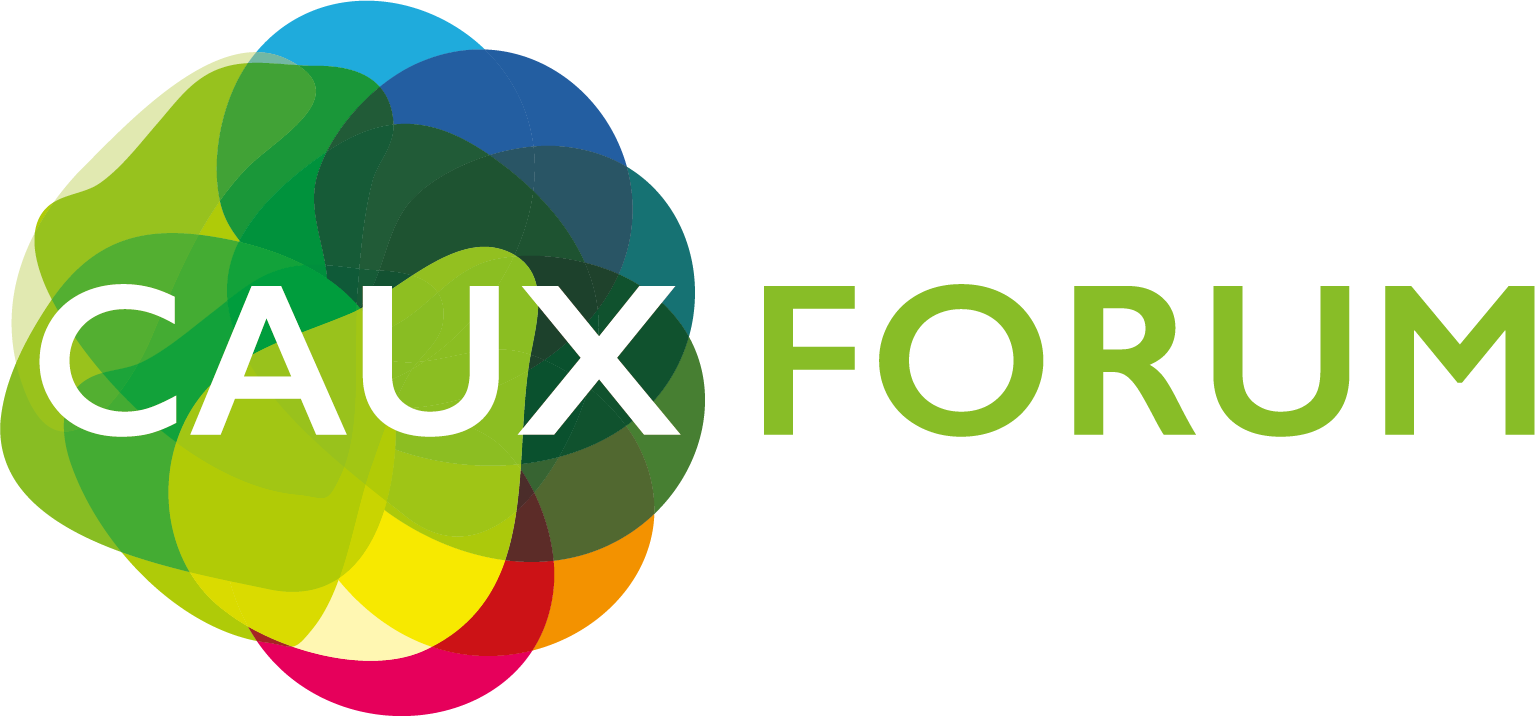
Caux Democracy Forum 2025 - Programme
programme
Tuesday, 08 July
Opening Ceremony
- LANGUAGE SPOKEN: English
- INTERPRETATION: French, English, AI-supported interpretation (60+ languages)
_________________________________________________________________
MODERATION & INTRODUCTION: Exploring the Caux Forum 2025 - Methods and Mindset
- Ignacio PACKER (UK/Spain/Switzerland), Executive Director Caux Initiatives of Change Foundation
MUSICAL INTERLUDE
- Jean-Marc VIGNOLI (France), violinist
WELCOME WORDS
- Jacqueline COTÉ (Canada/Switzerland), President Caux Initiatives of Change Foundation
REIMAGINING DEMOCRACY(IES) - Youth Perspectives
- Hajar BICHRI (Morocco), Creative Leadership, from our parallel youth democracy programme "Reimagining Democracy(ies), introducing a short film presenting their fresh perspectives and hope.
MUSICAL INTERLUDE
ADDRESS by Council of Europe Representative
- Ambassador Francesca Camilleri VETTIGER (Malta), Chair of the Committee of Ministers’ Deputies, Malta's Permanent Representative to the Council of Europe
MUSICAL INTERLUDE
KEYNOTE ADDRESS
- Philippe LAZZARINI (Switzerland), UNRWA Commissioner-General
A TIME TO REFLECT
- Joseph DEISS (Switzerland), Swiss Economist and Politician, former President of the Swiss Confederation and former President of the United Nations General Assembly
MUSICAL INTERLUDE
EXPLORING PERSONAL CHANGE & WHAT TO EXPECT AT THE CAUX FORUM 2025
- Ignacio PACKER, Executive Director Caux Initiatives of Change Foundation
MUSICAL INTERLUDE
Refreshments
Parallel Sessions: Integrity - Trust - Courage
Participants choose one of the three sessions at the front desk when arriving at the Caux Palace (colour cards)
SESSION 1: REVITALIZING DEMOCRACY - INTEGRITY
Help us explore together the role of integrity as a democratic value. Bring your experience to the table and share your stories as we un pack the complex and timely question regarding the importance of integrity in revitalising democracy.
- WHERE: Caux Palace Theatre (4th floor)
- LANGUAGE SPOKEN: English
- INTERPRETATION: AI-supported interpretation (60+ languages)
WITH:
- Ambassador Christian GUILLERMET-FERNÁNDEZ (Costa Rica), Permanent Representative of Costa Rica to the United Nations in Geneva
- Corinne MOMAL-VANIAN (France), Executive Director, Kofi Annan Foundation
- Dilara BAYARAK (Switzerland), Lawyer & Member of Grand Council of Geneva, Switzerland
- Shukria BARAKZAI (Afghanistan), Politician, Journalist & Women’s Rights Advocate
- Elder Alvin MANITOPYES (Canada), Co-Founder Awotaan Native Women’s Shelter and the Plains Indian Cultural Survival School
CO-MODERATION:
- Sarah NOBLE (Canada/Switzerland), Head of Global Engagement, Caux Initiatives of Change
- Jonas TRUNEH (UK), Creative Leadership & Project Development Officer at Triangle
____________________________________________________________________________________
SESSION 2: REVITALIZING DEMOCRACY - TRUST
We would love to hear from you! Join the conversation and explore with us the pathways towards (re)building trust to strengthen and revitalise democracy.
- WHERE: Main Hall (4th floor)
- LANGUAGE SPOKEN: English
- INTERPRETATION: French, Korean, AI-supported interpretation (60+ languages)
WITH:
- Ambassador Nathalie CHUARD (Switzerland), Director of DCAF - Geneva Centre for Security Sector Governance
- Roohullah SHINWARI (Afghanistan), Head of External Relations at AFA
- Anas ANSAR (Bangladesh), Senior Researcher at the Arnold-Bergstraesser-Institut, University of Freiburg, Germany
- Jordan DAVIS (USA), RTS Correspondent in the USA and host of “Democracy! Démocratie!”
CO-MODERATION:
- Ignacio PACKER, Executive Director Caux Initiatives of Change
- Sidra RASLAN (Syria), Creative Leadership & Amplify Impact Partner Sustainability Program Support and Community Lead at HP
____________________________________________________________________________________
SESSION 3: REVITALIZING DEMOCRACY - COURAGE
Share your insights and experiences as we explore what it means to live thoughtfully, responsibly and courageously in a fast-changing world.
- WHERE: The Galleries (4th floor wing next to entrance hall)
- LANGUAGE SPOKEN: English
- INTERPRETATION: French, AI-supported interpretation (60+ languages)
WITH:
- Godfrey MWAMPEMBWA aka GADO (Kenya), Graphic journalist, Cartoonist, Animator & TV Producer
- Konstantine GAGNIDZE (Georgia), Founder & President of JEF Georgia
- Hamza GHANDOUR (Lebanon), Peacebuilder & Coach, youth from Lebanon
- Bahistha NOHTANI (Afghanistan), Dentist, Women's Rights Activist & Co-Founder of Afghanistan Women's Rights Association (AWRA)
- Shahida TULAGANOVA (Uzbekistan), Producer & Director
CO-MODERATION:
- John BOND (Australia/UK), Journalist & Author, Initiatives of Change
- Manuela GARAY (Canada), Creative Leadership
Reception / Caux Peace Park Inauguration / Vernissages / Networking
17:45: Opening Reception
__________________________________________________
18:00 - 18:10: Caux Peace Park Inauguration
WITH:
- Jacqueline COTÉ (Canada/Switzerland), President Caux Initiatives of Change Foundation
- Olivier GFELLER (Switzerland), Mayor of Montreux
- Andreas LARENTZAKIS (Australia), Executive Director IIPT - International Institute for Peace through Tourism
More information about the Caux Peace Park as part of the Global Peace Parks Initiative
__________________________________________________
18:30: Vernissages & Invitation to visit the three Caux Palace Expos
WITH:
- Anne-Catherine SUTERMEISTER (Switzerland), Head of Community Engagement, Arts & Training Programmes - Switzerland, Caux Initiatives of Change
- Godfrey MWAMPEMBWA / Gado (Kenya), Graphic journalist, independent editorial cartoonist, animator, and TV producer
EXPO 1: "Dialogues on Humanity"
An exhibition produced thanks to a partnership between Photo Elysée - Lausanne, the Swiss Federal Department of Foreign Affairs and the International Committee of the Red Cross.
Where: Caux Palace Esplanade (gardens)
__________________________________________________
EXPO 2: "Democracy? What democracy?!"
An exhibition with press cartoons by Godfrey MWAMPEMBWA aka GADO (Kenya) and Nadia KHIARI, alias Willis from Tunis (Tunisia).
Where: The Galleries (4th floor wing next to entrance hall)
__________________________________________________
EXPO 3: "Nuclear Cries Through Innocent Eyes"
A powerful art exhibit that brings to life the emotional and generational impact of nuclear testing in the Marshall Islands—seen and expressed through the eyes of young Pacific Islanders. A a collaboration between the Permanent Mission of the Republic of the Marshall Islands to the United Nations Office and other international organizations in Geneva, and the Marshallese Educational Initiative (MEI).
More about our exhibition and their artists
Where: The Galleries (4th floor wing next to entrance hall)
Buffet Dinner
Concert: Licia Chery & Raoul Baumann
With:
- Licia CHERY (Switzerland/Haïti), Author, Singer, Composer, Publisher & Presenter
- Raoul BAUMANN (Switzerland), Composer, Arranger & Producer
Organised with the support of the Montreux Jazz Artists Foundation
Introduction:
- Anne-Catherine SUTERMEISTER (Switzerland), Head of Community Engagement, Arts & Training Programmes - Switzerland, Caux Initiatives of Change
Followed by refreshments in the Main Hall
Songs for Peace, Unity & Reconciliation Songs (Taizé Songs)
With:
- Tsvetana PETRUSHINA, Singer, Composer, Vocal Coach
Wednesday, 09 July
Greeting the Day Ceremony & Planting of the Caux Peace Park Tree
With:
- Alvin MANITOPYES (Canada), Co-Founder Awotaan Native Women’s Shelter and the Plains Indian Cultural Survival School
- Andreas LARENTZAKIS (Australia), Executive Director IIPT - International Institute for Peace through Tourism
More information about the Caux Peace Park as part of the Global Peace Parks Initiative
A Moment of Quiet Reflection
Enjoy a moment of quiet, inspiration and music by the bay window in the Main Hall, with a breathtaking view of the rising sun on the Swiss mountains and the lake.
Breakfast
Personal Stories & Conversations: Integrity
- Language spoken: English
- Interpretation: French, Korean, AI-supported interpretation (60+ languages)
With:
- Marina LITVINENKO (Russia), Public Speaker and Justice Campaigner
- DR Drissa KANAMBAYE (Mali), Mission Manager in the Communication and Public Relations Unit at the Office of the Prime Minister of Mali
- Lee JU-YOUNG (South Korea), Lawyer, Former Minister and Parliamentarian, President of MRA/IofC Korea
Co-Moderators:
- Sophie KAYES (UK), Human Rights Advocate & Campaigner
- Daniel CLEMENTS (UK), Creative Leadership initiative for young leaders
Coffee & Tea Break
Community Groups
Community Groups are a core part of the Caux Democracy Forum experience, helping to build a sense of unity and shared purpose—“Let’s do this together!”
Meeting three times during the Caux Democracy Forum (9–11 July, 11:15–12:15), these small, diverse groups of around 15 participants offer a space to reflect on the plenary themes, exchange ideas, and learn from one another’s lived experiences.
Guided by a community group facilitator, each session creates a safe, respectful environment where deep conversations can flourish and real connections begin.
With ground rules rooted in trust, inclusion, and care, these groups invite you to be fully present, listen openly, and speak from the heart—if and when you feel ready and are often a great place to forge new and inspiring friendships.
Lunch
Free Time
Welcome to our Thematic Tracks, Common Cause Groups...and more!
How does it work?
- Build your own afternoon agenda
- Mix and match sessions freely
____________________________________________________________________
THEMATIC TRACK 1 - HEALING THE WOUNDS OF THE PAST
Facing Dictators : The Power of Truth over Tyranny
- Room: Main Hall
- Language spoken: English
- Interpretation: French
With:
- Marina LITVINENKO (UK/Russia), Public Speaker & Justice Campaigner
- Shahida TULANGAYEVA (Uzbekistan), Producer & Director
- Natalia ARNO (Russia), Founder & President of Free Russia Foundation
Co-Moderators:
- Sophie KAYES (UK), Human Rights Advocate & Campaigner
- Jonas TRUNEH (UK), Creative Leadership initiative for young leaders
____________________________________________________________________
THEMATIC TRACK 2 - TOWARDS A THRIVING ECONOMY FOR PEOPLE AND PLANET
Artificial Intelligence, Inner Growth and the Future of Democracy
- Room: 400 (Foyer du Théâtre)
- Language spoken: English
- Interpretation: AI-supported interpretation (60+ languages)
With:
- Dr Cecilia CANNON, Managing Director, PolySinc (remotely)
- Asheesh KHANEJA (India), Innovation Catalyst, Caux Initiatives of Change
- Tea MUSTAC (Croatia), Data Protection & AI Governance Expoert, Spirit Legal
Moderator:
- Sandra UWANTEGE HART (USA/Rwanda), Tech4Good Strategist, Polisync
____________________________________________________________________
THEMATIC TRACK 3 - PEOPLE FOSTERING SOCIETAL COHESTION
Promoting Democracy Dialogues – Constructive Conversations
- Room: 300 D & E
- Language spoken: English
- Interpretation: no interpretation offered
Resource person :
- Heinrich PICK (Germany), Managing Director Elfgenpick & board member IofC Germany, and his experience with democracy dialogues in the city of Augsburg/Germany.
Co-Moderators:
- Christoph SPRENG (Switzerland), IofC International’s representative to the Council of Europe
- Dr Laurie JOHNSTON (USA), Professor of Theology, Emmanuel College, Boston/USA
____________________________________________________________________
CULTURAL MEDIATION WORKSHOP
Creative Voices, Democratic Choices : How the Arts and Culture strengthen Democracy – “Dialogues on Humanity”
- Room: The Galleries (4th floor)
- Language spoken: English
- Interpretation: no interpretation offered
Organisers :
- Yvan LOEHLE (Switzerland), Head of Protection, Humanitarian Competence Centre, Swiss Development Cooperation
- Anne-Catherine SUTERMEISTER (Switzerland), Head of Community Engagement, Arts & Training Programmes for Switzerland, Caux Initiatives of Change Foundation
____________________________________________________________________
COMMON CAUSE GROUPS
Reimagining Democracy(ies), leadership programme for young leaders, by Creative Leadership (on invitation only)
- Room: Villa Maria (closed group)
Young Changemakers Programme
- Room: Restaurant français
Caux Round Table Japan
- Room: 400 A - Salon du Pasquier (4th floor)
- Language spoken: English & Japanese
- Interpretation: no interpretation offered
A Vision for Initiatives of Change's Global Priorities, by IofC International (on invitation only)
- Room: 461 - Salon Grammont
- Language spoken: English
Coffee & Tea Break
THEMATIC TRACK 1
Resisting Repression, Imagining Justice - Guinea, Military Rule, and the Fight for Accountability
- Room: 300D & E
- Language spoken: English
- Interpretation: AI-supported interpretation (60+ languages)
With:
- Ibrahima DIALLO (Guinea), Founder of the Maison de la Démocratie et des Droits de l'Homme (M2DH)
- Mathieu POURCHIER (France), Executive Director, Tournons la Page
Co-Moderators:
- Sophie KAYES (UK), Human Rights Advocate & Campaigner
- Sawsan RASLAN (Syria), Creative Leadership
____________________________________________________________________
THEMATIC TRACK 2
Socially Responsible Business - A Japanes Initiative
- Room: 400 (Foyer du Théâtre)
- Language spoken: English
- Interpretation: no interpretation offered
With:
- Hironori YANO (Japan), Chair Caux Round Table Japan
- Hiroshi ISHIDA (Japan), Executive Director, Caux Round Table Japan
Co-Moderators:
- Mark GOYDER (UK), Founder Director of Tomorrow’s Company
- Sarah NOBLE (Canada/Switzerland), Head of Global Engagement, Caux Initiatives of Change
- Jonas TRUNEH (UK), Creative Leadership & Project Development Officer at Triangle
____________________________________________________________________
COMMON CAUSE GROUPS
What happens with U.S.? (with: Allan-Charles Chipman, IofC USA)
- Room: Main Hall
- Language spoken: English
- Interpretation: French, English
Reimagining Democracy(ies), leadership programme for young leaders, by Creative Leadership (on invitation only)
- Room: Villa Maria (closed group)
Young Changemakers Programme
- Room: Restaurant français
Caux Round Table Japan
- Room: 400 A - Salon du Pasquier (4th floor)
- Language spoken: English & Japanese
- Interpretation: no interpretation offered
A Vision for Initiatives of Change's Global Priorities, by IofC International (on invitation only)
- Room: 461 - Salon Grammont
- Language spoken: English
Evening Meal
Caux Candlelight Conversations
Step into the heart of the Caux Democracy Forum with our signature Candlelight Conversations—an inspiring evening experience designed to spark deep, authentic dialogue.
Set in softly lit rooms at the Caux Palace, these sessions create a serene and reflective atmosphere for meaningful exchanges. Participants select a discussion group based on a topic that resonates with them, each guided by an experienced conversation lead and supported by a facilitator to ensure a smooth and enriching experience.
With intentionally small group sizes and a focus on trust-building, the Caux Candlelight Conversations offer a unique opportunity to go beyond the surface, share perspectives, and be part of conversations that truly matter.
Songs for Peace, Unity & Reconciliation Songs (Taizé Songs)
With:
- Tsvetana PETRUSHINA, Singer, Composer, Vocal Coach
Thursday, 10 July
Greeting the Day Ceremony
With:
- Alvin MANITOPYES (Canada), Co-Founder Awotaan Native Women’s Shelter and the Plains Indian Cultural Survival School
A Moment of Quiet Reflection
Enjoy a moment of quiet, inspiration and music by the bay window in the Main Hall, with a breathtaking view of the rising sun on the Swiss mountains and the lake.
Breakfast
Personal Stories & Conversations: Trust
- Language spoken: English
- Interpretation: French, Korean, AI-supported interpretation (60+ languages)
With:
- Ismar VILLAVIVENCIO (Honduras/Uruguay), Life Coach & Core Team Member Regional Trust-Building Programme of the Americas
- Mahbouba SERAJ (Afghanistan), Executive Director of the Afghan Women Skills Development Center
- Kateryna MALTSEVA (Ukraine), Programme Director Association for Communities Participatory Development
Co-Moderators:
- Sarah NOBLE (Canada/Switzerland), Head of Global Engagement, Caux Initiatives of Change
- Maruee PAHUJA (India), Creative Leadership
Coffee & Tea Break
Community Groups
Lunch
Free Time
THEMATIC TRACK 1
Carrying the Unspoken: Afghan Women and the Work of Remembering
- Room: The Galleries (4th floor next to entrance hall)
- Language spoken: English
- Interpretation: no interpretation offered
With:
- Axel DUBINSKI, Co-Founder and Managing Director of TraumaHelden® gGmbH
- Shukria Barakzai, Politician, Journalist & Women’s Rights Advocate
- Bahishta Nohtan, Dentist, Women's Rights Activist & Co-Founder of Afghanistan Women's Rights Association (AWRA)
Co-Moderators:
- Sophie KAYES (UK), Human Rights Advocate & Campaigner
- Asmaa SLEEM (Egypt), Creative Leadership
________________________________________________________________________
THEMATIC TRACK 2
How Can Africa And the World Together Create Thriving African Economies?
- Room: 400 - Foyer du Théâtre
- Language spoken: English
- Interpretation: no interpretation offered
With:
- Ndaizhivei GURARA (Zimbabwe), Legal Advisor with CNRG
- Farai MAGUWU (Zimbabwe), Executive Director, Centre for Natural Resource Governance
- Dr Drissa KANAMBAYE (Mali), Mission Manager in the Communication and Public Relations Unit at the Office of the Prime Minister of Mali
Co-Moderators:
- John BOND (UK/Australia), Journalist & Author, Initiatives of Change
- Maruee PAHUJA (India), Expressive Arts Consultant, Process Facilitator, Visual Artist, Creative Leadership
________________________________________________________________________
THEMATIC TRACK 3
Sustained Actions : Communities with a Purpose
- Room: 300 D & E
- Language spoken: English
- Interpretation: Ai-supported interpretation (60+ languages)
Resource person :
- Allan-Charles CHIPMAN (USA), Executive Director IofC USA, with the experience in the city of Richmond, VA/USA
Co-Moderators:
- Christoph SPRENG (Switzerland), IofC International’s representative to the Council of Europe
- Dr Laurie JOHNSTON (USA), Professor of Theology, Emmanuel College, Boston/USA
________________________________________________________________________
COMMON CAUSE GROUP: CONFLICTS IN THE MIDDLE EAST - PERSPECTIVES FROM FRANCE
- Room: Main Hall
- Language spoken: French & English
- Interpretation: English, French
SESSION 1: Restoring Mutual Understanding and Recognition as a Prerequisite for Trust
At the heart of Initiatives of Change’s philosophy is the belief that healing begins with acknowledging the inner motives, emotions, and prejudices of all those affected by conflict. To overcome division, the traumas and feelings of fear, insecurity, racism, injustice, betrayal, hatred, powerlessness, despair, and manipulated identities must first be heard and understood.
With:
- Radjaa ABOUDAGGA, Geostrategic Advisor
- Janine ELKOUBY, Professor of classical literature and former vice-president of the Jewish Consistory of the Bas-Rhin
- Pierre HASKI, Journalist (pre-recorded speech)
- Yoav LEVY, Teacher of biblical studies and specialised in Hebrew texts
and others
Moderator:
- Brahim HAMMOUCHE (France), Head of the Psychiatry Department, Metz-Thionville Hospital, former Member of Parliament Moselle/France
________________________________________________________________________
MORE COMMON CAUSE GROUPS
Reimagining Democracy(ies), leadership programme for young leaders, by Creative Leadership (on invitation only)
- Room: Villa Maria (closed group)
Young Changemakers Programme
- Room: Restaurant français
Caux Round Table Japan
- Room: 400 A - Salon du Pasquier (4th floor)
- Language spoken: English & Japanese
- Interpretation: no interpretation offered
A Vision for Initiatives of Change's Global Priorities, by IofC International (on invitation only)
- Room: 461 - Salon Grammont
- Language spoken: English
Coffee & Tea Break
THEMATIC TRACK 1
From Wounds to Bridges: Overcoming Enmity and Reclaiming Connection
- Room: Main Hall
- Language spoken: English
- Interpretation: English / French
With:
- Oleksandra MATVIICHUK (Ukraine), Human Rights Defender working on issues in Ukraine and the OSCE region and heading the human rights organisation Center for Civil Liberties, which was awarded the 2022 Nobel Peace Prize (video address)
Co-Moderators:
- Sophie KAYES (UK), Human Rights Advocate & Campaigner
- David Abudlmalik NUHU, Creative Leadership
________________________________________________________________________
THEMATIC TRACK 2
Transforming Economies For Ecological And Social Flourishing
- Room: 400 - Foyer du Théâtre
- Language spoken: English
- Interpretation: no interpretation offered
With:
- Aili CHANNER (UK/France)
- Leela CHANNER (UK/France), PhD candidate in Behavioural Ecology & Photographer
- Mark GOYDER (UK), Founder Director of Tomorrow’s Company
Co-Moderator:
- John BOND (UK/Australia), Journalist & Author, Initiatives of Change
- Viviane STRAUB (Germany/UK), Creative Leadership & Teacher
________________________________________________________________________
THEMATIC TRACK 3
Working for Good Democratic Governance
- Room: 300 D & E
- Language spoken: English & French
- Interpretation: AI-supported interpretation (60+ languages)
Resource persons :
- Fabrice DALONGEVILLE (France), Independent Consultant & Mayor of Auger-Saint-Vincent, on his experience on civic engagement & good governance in France
- Christoph SPRENG (Switzerland), IofC International’s representative to the Council of Europe, with experiences at the Council of Europe and International Labour Organisation.
Moderator:
- Dr Laurie JOHNSTON (USA), Professor of Theology, Emmanuel College, Boston/USA
________________________________________________________________________
CULTURAL MEDIATION WORKSHOP
Creative Voices, Democratic Choices : How the Arts and Culture strengthen Democracy – “Democracy? What Democracy?”
- Room: The Galleries (4th floor next to entrance hall)
- Language spoken: English
- Interpretation: no interpretation offered
Organisers :
- Godfrey MWAMPEMBWA (GADO) (Kenya), Cartoonist & Artist
- Anne-Catherine SUTERMEISTER (Switzerland), Head of Community Engagement, Arts & Training Programmes for Switzerland, Caux Initiatives of Change Foundation
________________________________________________________________________
COMMON CAUSE GROUPS
Reimagining Democracy(ies), leadership programme for young leaders, by Creative Leadership (on invitation only)
- Room: Villa Maria (closed group)
Young Changemakers Programme
- Room: Restaurant français
Caux Round Table Japan
- Room: 400 A - Salon du Pasquier (4th floor)
- Language spoken: English & Japanese
- Interpretation: no interpretation offered
A Vision for Initiatives of Change's Global Priorities, by IofC International (on invitation only)
- Room: 461 - Salon Grammont
- Language spoken: English
Evening Meal
Filmscreening & Panel Discussion: "Les Doléances" - The Voices of Citizens: Betweewn Grievances and Participation
- Room: Theatre
- Language spoken: English & French (film in French with English subtitles)
- Interpretation: English, French, AI-supported interpretation (60+ languages)
With:
- Dilara BAYRAK (Switzerland), Lawyer & Member of Grand Council of Geneva, Switzerland
- Allan-Charles CHIPMAN (USA), Executive Director of Initiatives of Change USA
- Fabrice DALONGEVILLE (France), Independent Consultant & Mayor of Auger-Saint-Vincent (France)
Moderator:
- Jordan DAVIS (USA), RTS Correspondent in the USA and host of “Democracy! Démocratie!”
Songs for Peace, Unity & Reconciliation Songs (Taizé Songs)
With:
- Tsvetana PETRUSHINA, Singer, Composer, Vocal Coach
Friday, 11 July
Greeting the Day Ceremony
With:
- Alvin MANITOPYES (Canada), Co-Founder Awotaan Native Women’s Shelter and the Plains Indian Cultural Survival School
A Moment of Quiet Reflection
Enjoy a moment of quiet, inspiration and music by the bay window in the Main Hall, with a breathtaking view of the rising sun on the Swiss mountains and the lake.
Breakfast
Personal Stories & Conversations: Courage
- Language spoken: English
- Interpretation: English, French, Korean & AI-supported interpretation (60+ languages)
With:
- Farai MAGUWU (Zimbabwe), Executive Director, Centre for Natural Resource Governance
- Natalia ARNO (Russia), Founder & President of Free Russia Foundation
- Yukihisa Fujita (Japan), Former Vice-Minister of Finance and former member of Upper and Lower Houses of the Japanese Diet (Parliament)
Co-Moderators:
- John Bond (Australia/UK), Journalist & Author, Initiatives of Change
- Sawsan RASLAN (Syria), Creative Leadership
Coffee & Tea Break
Community Groups
Lunch
Free Time
THEMATIC TRACK 1
Where the Past Still Bleeds: A Workshop on Memory, Healing, and Reconciliation
- Room: The Galleries (4th floor next to entrance hall)
- Language spoken: English
- Interpretation: no interpretation offered
With:
- Arshalouys TENBELIAN (Lebanon), Communications Specialist & Co-Chair Kurdish-Armenian-Turkish Dialogue
Co-Moderators:
- Sophie KAYES (UK), Human Rights Advocate & Campaigner
- Steven LIN (Canada), Creative Leadership
________________________________________________________________________
THEMATIC TRACK 2
How Can We Each Advance Human Rights In Our Situation?
- Room: 400 - Foyer du Théâtre
- Language spoken: English
- Interpretation: AI-supported interpretation (60+ languages)
With:
- Michael CAMILLERI (USA), Chief of Branch at the United Nations Rights Office in Geneva
and others
- Farai MAGUWU (Zimbabwe), Executive Director, Centre for Natural Resource Governance
________________________________________________________________________
COMMON CAUSE GROUP: CONFLICTS IN THE MIDDLE EAST - PERSPECTIVES FROM FRANCE
SESSION 2: Religions, both Instruments of Conflict and Potential Sources of Peace
- Room: Main Hall
- Language spoken: French & English
- Interpretation: French, English
In this region, where the three major monotheistic religions originated, spirituality can be both exploited for political ends and harnessed as a powerful force for healing and reconciliation. This round table will explore how religious traditions contribute to conflict, but also how they can serve as bridges to peace and understanding.
With:
- Hervé Élie BOKOBZA, Theologian & Writer
- Ghaleb BENCHEIKH, Islamologist & President of the Foundation of Islam in France
- Claire REGGIO, Teacher & Trainer, Aix-Marseille University & Domuni Universitas
- Antoine ARJAKOVSKY, Director of Research, Collège des Bernardins, Paris
and others
Moderator:
- Brahim HAMMOUCHE (France), Head of the Psychiatry Department, Metz-Thionville Hospital, former Member of Parliament Moselle/France
____________________________________________________________________
MORE COMMON CAUSE GROUPS
Reimagining Democracy(ies), leadership programme for young leaders, by Creative Leadership (on invitation only)
- Room: Villa Maria (closed group)
Young Changemakers Programme
- Room: Restaurant français
Armenian-Turkish-Kurdish Dialogue
- Room: 315
Caux Round Table Japan
- Room: 400 A - Salon du Pasquier (4th floor)
- Language spoken: English & Japanese
- Interpretation: no interpretation offered
A Vision for Initiatives of Change's Global Priorities, by IofC International (on invitation only)
- Room: 461 - Salon Grammont
- Language spoken: English
Coffee & Tea Break
THEMATIC TRACK 1 / COMMON CAUSE GROUP: CONFLICTS IN THE MIDDLE EAST - PERSPECTIVES FROM FRANCE
SESSION 3: Building International Awareness of the Middle East Conflicts
- Room: Main Hall
- Language spoken: English, FRench
- Interpretation: English, French
This session will focus on the role of civil society and European nations in fostering a shared global consciousness around these conflicts. It will explore how to rehumanise international relations, galvanise social energy, and give real substance to human rights and solidarity.
With:
- Rafaël TYSZBLAT (France), Mediator & Trainer in Interconvictional and Interidentity Dialogue at Connecting Actions
- Bertrand BADIE (France) (pre-recorded speech), Political Scientist & Expert in International Relations
- Alain MICHEL (Switzerland), Co-founder & President of ÉquiLibre, Founder of Hommes de Parole
- DR. Peter SHAMBROOK (UK), Independant Scholar, Author & Historical Consultant at the Balfour Project
- Elio AZAR (Lebanon), Special Initiatives Coordinator, Principles for Peace
and others.
Moderator:
- Brahim HAMMOUCHE (France), Head of the Psychiatry Department, Metz-Thionville Hospital, former Member of Parliament Moselle/France
________________________________________________________________________
THEMATIC TRACK 2
A Course To Help Rebuild A Shattered Nation
- Room: 400 - Foyer du Théâtre
- Language spoken: English
- Interpretation: AI-supported interpretation (60+ languages)
With:
- Claudine HAENNI (Switzerland), Leadership Skills Trainer for people in Myanmar
and a participant from Myanmar
Moderator:
- John BOND (Australia/UK), Journalist & Author, Initiatives of Change
- Hani ABOU FADEL (Lebanon), Creative Leadership
________________________________________________________________________
THEMATIC TRACK 3
Pioneering Minority Right : The Bonn-Copenhagen Declarations
- Room: 300 D & E
- Language spoken: English
- Interpretation: no interpretation offered
A presentation & conversation with:
- Christoph SPRENG (Switzerland), IofC International’s representative to the Council of Europe
Moderator:
- Dr Laurie JOHNSTON (USA), Professor of Theology, Emmanuel College, Boston/USA
________________________________________________________________________
MORE COMMON CAUSE GROUPS
Reimagining Democracy(ies), leadership programme for young leaders, by Creative Leadership (on invitation only)
- Room: Villa Maria (closed group)
Young Changemakers Programme
- Room: Restaurant français
Caux Round Table Japan
- Room: 400 A - Salon du Pasquier (4th floor)
- Language spoken: English & Japanese
- Interpretation: no interpretation offered
A Vision for Initiatives of Change's Global Priorities, by IofC International (on invitation only)
- Room: 461 - Salon Grammont
- Language spoken: English
Evening Meal
Caux's got Talent!
- Language spoken: English
- Interpretation: English, French, Korean
MC:
Creative Leadership youth initiative
Songs for Peace, Unity & Reconciliation Songs (Taizé Songs)
With:
- Tsvetana PETRUSHINA, Singer, Composer, Vocal Coach
Saturday, 12 July
Greeting the Day Ceremony
With:
- Alvin MANITOPYES (Canada), Co-Founder Awotaan Native Women’s Shelter and the Plains Indian Cultural Survival School
A Moment of Quiet Reflection
Enjoy a moment of quiet, inspiration and music by the bay window in the Main Hall, with a breathtaking view of the rising sun on the Swiss mountains and the lake.
Breakfast
Personal Stories & Conversations: Hope
- Language spoken: English
- Interpretation: French, English, Korean, AI-supported interpretation (60+ languages)
With:
- A Vision for Initiatives of Change's Global Priorities
- Participants from the Creative Leadership programme "Reimagining Democracy(ies)"
- Teenagers & young adults from the Caux Young Changemakers Programme
- Rafaël TYSZBLAT, Mediator & Trainer in Interconvictional and Interidentity Dialogue at Connecting Actions
- Armenian-Turkish-Kurdish Dialogue
- Caux Round Table Japan
Moderators:
- Viviane STRAUB (Germany/UK), Creative Leadership
- Ignacio PACKER (UK/Switzerland/Spain), Executive Director, Caux Initiatives of Change
Tea & Coffee Break
Closing Ceremony & Open Mic
- Language spoken: English
- Interpretation: French, English, Korean, AI-supported interpretation (60+ languages)
Co-Moderators:
- Ignacio PACKER, Executive Director Caux Initiatives of Change
- Sarah NOBLE, Head of Global Engagement, Caux Initiatives of Change
